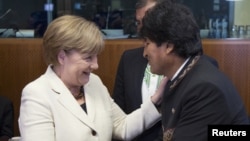Unable to match China's offer of $250 billion in investment in Latin America, the EU sought ways Thursday to avoid being marginalized in the region, offering new trade deals, visa-free travel and deeper ties.
At a two-day summit with Latin American leaders in Brussels, European leaders briefly put aside concerns about Greece, Ukraine and Britain's future in Europe to stress they had not forgotten former colonies.
"We have seen that China has built up very intensive trade relations," said German Chancellor Angela Merkel. "Europe and Latin America should also increase their trade."
The European Union's meeting with the Community of Latin American and Caribbean States follows China's summit six months ago with the 33-country bloc, at which President Xi Jinping pledged $250 billion in investment over 10 years.
Struggling with the impact of a debt crisis that nearly broke up the eurozone, Europe has little fresh cash to invest. Instead, it is opting to use its influence as the world's largest trade bloc, gradually creating a patchwork of deals. EU officials said that, as China's demand for Latin America's commodities lessens, Europe has a chance to reassert itself.
The EU agreed with Brazil to again try to unblock long-stalled talks with the South American trade bloc Mercosur, committing to exchange offers on opening up their respective markets by the end of this year.
Brussels will launch talks to deepen trade agreements with Mexico and Chile to reduce barriers to business. Ecuador is in the process of implementing a free-trade accord with the EU.
Other agreements at the summit included five Caribbean states winning visa-free travel to Europe, with Colombia and Peru next in line.
The EU and Brazil discussed plans for a $185 million undersea communications cable from Lisbon to Fortaleza to reduce Brazil's reliance on the United States. Brazil wants to shield its Internet traffic from U.S. surveillance after Washington spied on Brazilian President Dilma Rousseff's phone and email.
Despite U.S. sanctions on Venezuela, the EU avoided criticism of socialist President Nicolas Maduro, who is facing civil unrest and did not attend the summit.
Venezuela's socialist ally, Ecuadorian President Rafael Correa, rejected any rebuke of Maduro, saying the U.S. position describing Venezuela as a national security threat was "absurd."
Spanish Prime Minister Mariano Rajoy expressed frustration, saying as he left the meeting: "I believe that the future of Venezuela is in dialogue, democracy, freedom and the respect for the law."










